The weight of disappointment was palpable as Croatia manager Zlatko Dalic faced the media, his emotions raw after Croatia’s near miss at Euro 2024. While their fate remained technically undecided until Slovenia’s draw against England sealed it, Dalic, and many Croatian fans, sensed the looming end. This wasn’t just the conclusion of a tournament; it felt like the potential finale for a celebrated generation of Croatian football icons, and perhaps even Dalic’s own tenure.
Throughout Euro 2024, Croatia’s passionate fanbase transformed stadiums into seas of red and white. They traveled in droves to Berlin, Hamburg, and Leipzig, their vibrant energy and unwavering support a constant presence. Remarkably, they often outnumbered opposing fans, such as the Italians, creating an atmosphere that underscored the deep connection between the team and its nation.
“This signifies that the national team has transcended mere sport; it has become a movement,” a visibly moved Dalic articulated. “It’s a cult, a symbol of our nation. I implore them to remain united and to continue supporting this national team, with unwavering love in both moments of defeat and victory.”
Croatia’s ascent to the upper echelons of world football, highlighted by their World Cup final appearance in 2018, semi-final run in 2022, and a Nations League final in 2023, had amplified their global support exponentially. However, the backbone of this successful squad is aging. Luka Modric, the midfield maestro, is 38. His esteemed partners, Marcelo Brozovic (31) and Mateo Kovacic (30), are also past their prime years in football terms. Ivan Perisic is 35, Andrej Kramaric is 33, and Ante Budimir is 32. Dalic himself has been at the helm for seven years, a significant span in international football management.
Their Euro 2024 journey concluded with a painful group stage elimination, sealed by Italy’s dramatic late equalizer. This exit raises a critical question: Is this the definitive end of an era for one of Europe’s most admired national teams of the past decade? Similar to the scrutiny faced by Gareth Southgate with England, Dalic, despite Croatia’s unprecedented success since 2018, has faced intense criticism at home following their underwhelming Euro 2024 performances.
To brand their tournament as a complete disaster would be an overstatement. Minute margins separated them from a far different outcome. Had they held onto leads against Albania and Italy just a few minutes longer in each match, Croatia would have secured six points and progressed from the challenging “group of death.”
Yet, juxtaposed against the remarkable highs of the recent World Cups, their Euro 2024 campaign is undeniably a profound disappointment. It has triggered considerable frustration, some anger, and widespread debate about what went wrong for Croatia at Euro 2024. This tournament marks Croatia’s poorest showing at a major international event since the 2014 World Cup, where a defeat against Mexico resulted in a group stage exit.
“I accept full responsibility for this failure,” Dalic stated, though he remained noncommittal about his future as Croatia manager.
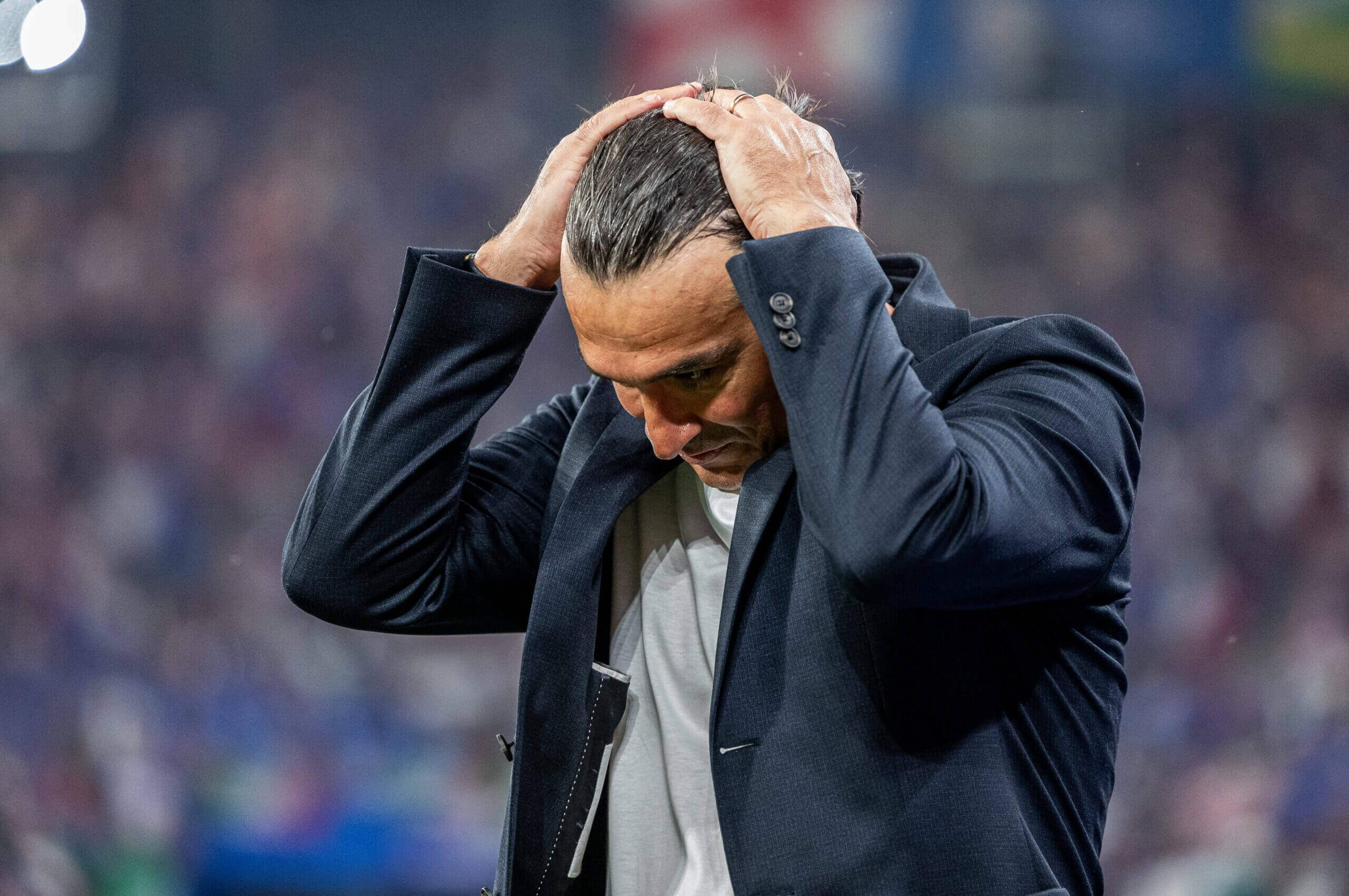 Zlatko Dalic Croatia boss in 2017
Zlatko Dalic Croatia boss in 2017
While the inexorable march of time affects players like Modric and his contemporaries, a valid critique of Dalic’s tenure is the perceived lack of a clear succession plan for the team’s core. A pre-tournament victory over Portugal offered a fleeting sense of optimism, but it ultimately proved deceptive. The result amplified expectations and fueled a belief that the golden generation could conjure one last major tournament triumph at Euro 2024.
Dalic opted for an unchanged starting XI for their opening match against Spain, mirroring the Portugal lineup. However, he seemingly overlooked the context: Portugal was missing several key players, including Cristiano Ronaldo, Pepe, Joao Cancelo, and Rafael Leao. Furthermore, it was merely a friendly match. “Following a strong performance against Portugal, a truly great game, it seemed illogical to make changes,” Dalic reasoned.
His unwavering loyalty to the older guard – understandable given their historic contributions to Croatian football – has become a point of contention. Discarding such players is undoubtedly a difficult decision (“As long as I live, I will be eternally grateful to them,” he affirmed in Germany). Marcelo Brozovic, in particular, has faced criticism, with suggestions that his move to Saudi Arabian club Al Nassr may have diminished his defensive midfield intensity.
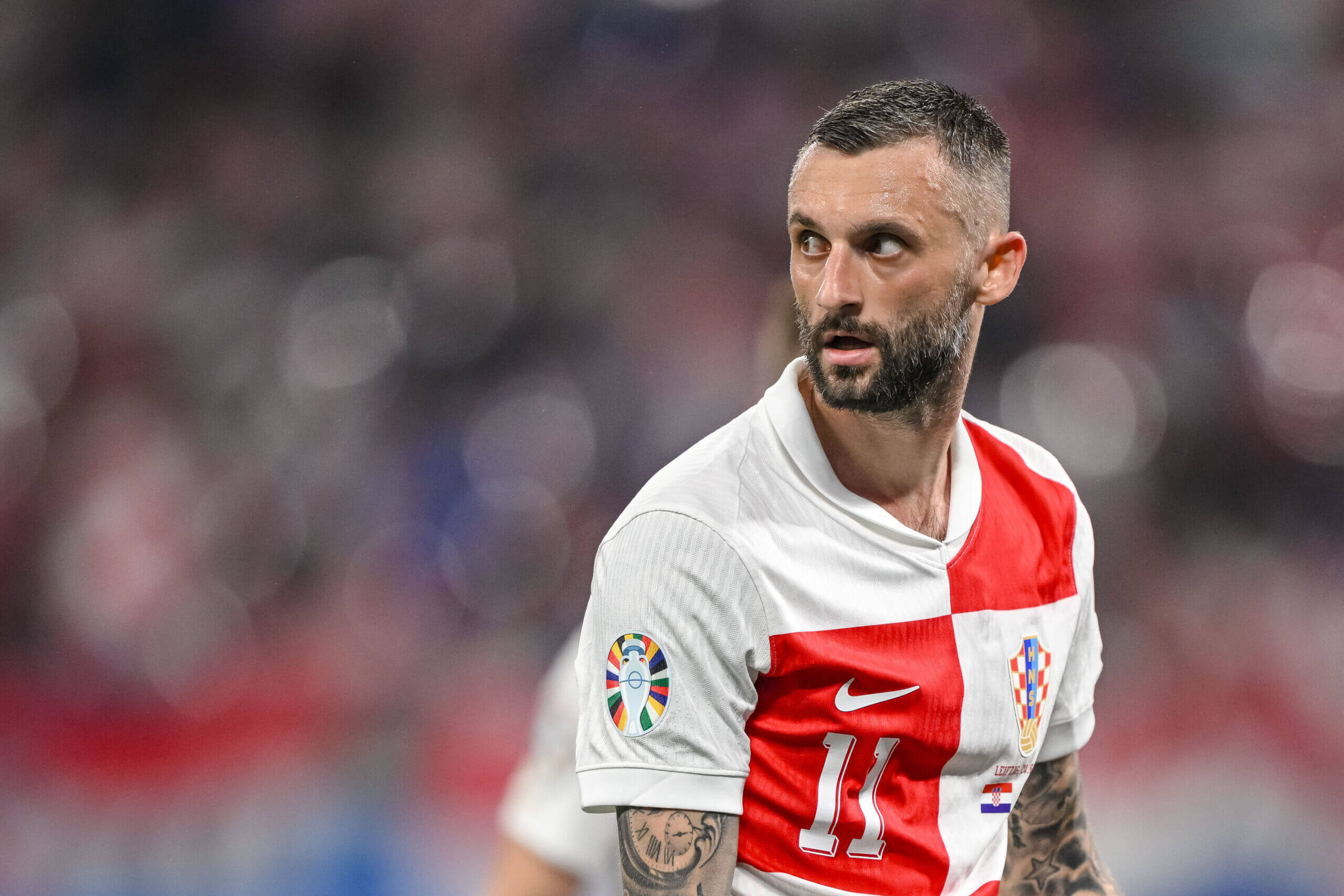 Marcelo Brozovic Saudi Arabia
Marcelo Brozovic Saudi Arabia
Players on the fringes, such as Ajax’s Borna Sosa, were largely overlooked. Perisic, despite recovering remarkably from a serious ACL injury, started at left-back against Albania but at times appeared his 35 years. Atalanta’s Mario Pasalic also saw limited game time.
Younger talents like Dinamo Zagreb’s 21-year-old Martin Baturina, touted as the “next Modric,” received a mere five minutes of playing time during Euro 2024. Luka Sucic, a dynamic 21-year-old midfielder from Red Bull Salzburg, was a bright spot when belatedly introduced against Italy.
Emerging prospects like Bayern Munich’s 19-year-old attacking midfielder Lovro Zvonarek are on the horizon, but he remains uncapped and had limited Bundesliga experience last season.
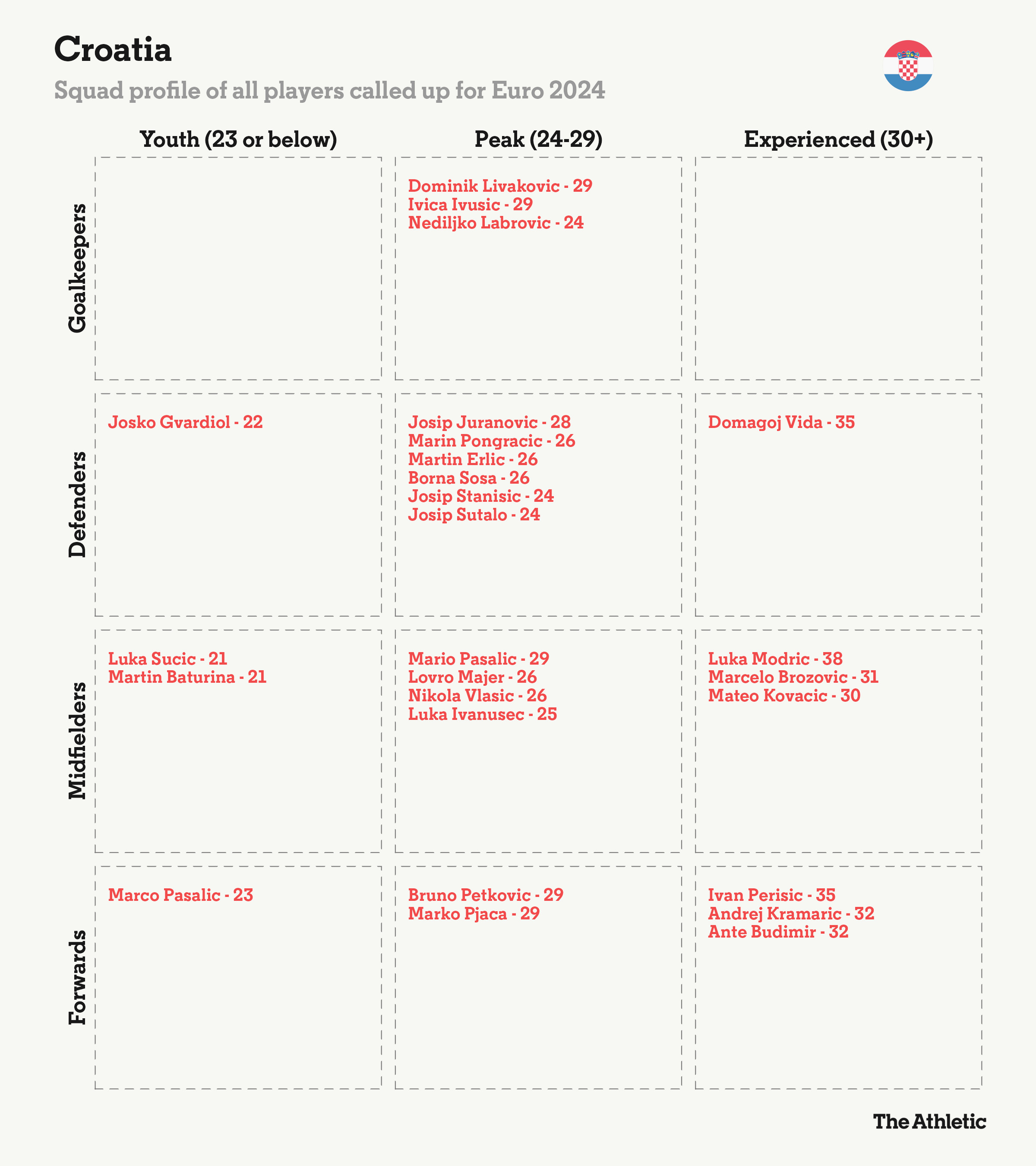 Croatia squad age profile
Croatia squad age profile
Dalic’s tactical approach at Euro 2024 appeared uncertain. He rotated his full-backs and center-backs, shifted Josko Gvardiol’s position, and experimented with six different forwards across the three group games. Only the established midfield trio of Modric, Kovacic, and Brozovic – once lauded by Dalic as the world’s best – remained constant.
While the midfield wasn’t solely to blame, a noticeable lack of dynamism and creativity permeated their play at times. Modric, despite his enduring influence and crucial goal against Italy, lacked his usual rhythm, having started only a limited number of league games for Real Madrid last season. Kovacic also had a somewhat reduced role at Manchester City, and Brozovic’s Saudi Arabian stint raised questions about his sharpness.
Scorer. Leader. Record-breaker.
🇭🇷 Luka Modrić 👏@Vivo_GLOBAL | #EUROPOTM pic.twitter.com/W5cID41gTq
— UEFA EURO 2024 (@EURO2024) June 24, 2024
A significant vulnerability at Euro 2024 was Croatia’s porous defense. Having conceded a mere four goals in qualifying, they shipped six in just three group stage matches. A critical weakness was defending against crosses, particularly in-swinging deliveries.
Against Spain, despite packing the penalty area, Dani Carvajal, one of the smallest players, was left unmarked to score from a cross. Multiple Croatian defenders were nearby but failed to challenge effectively.
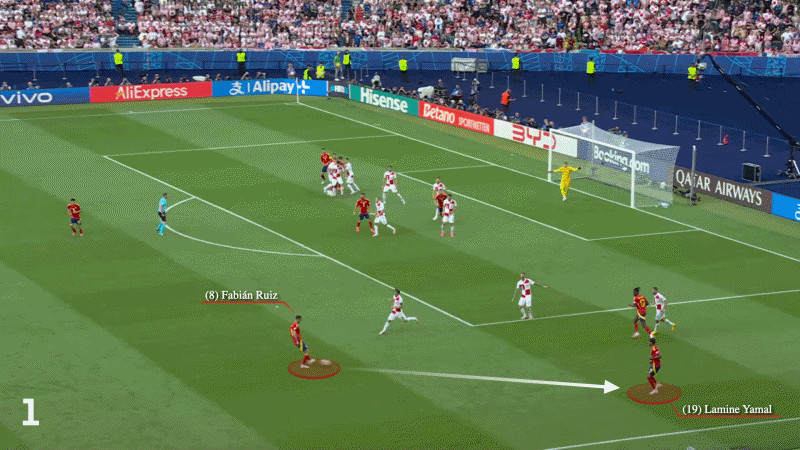 Croatia Spain goal conceded 1
Croatia Spain goal conceded 1
This defensive frailty wasn’t new. A similar goal was conceded against Wales in Euro 2024 qualifying. Despite numerical superiority in the box, Harry Wilson scored from an in-swinging cross.
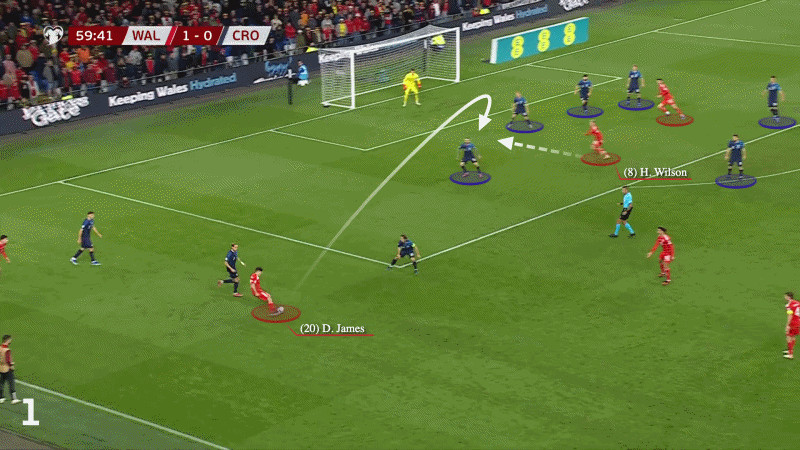 Croatia Wales goal conceded
Croatia Wales goal conceded
The pattern persisted against Albania. Josip Sutalo and Josko Gvardiol were too far apart, creating a gap exploited by Qazim Laci, who headed in another in-swinging cross. Albania’s late equalizer also stemmed from a cross that Croatia failed to defend adequately.
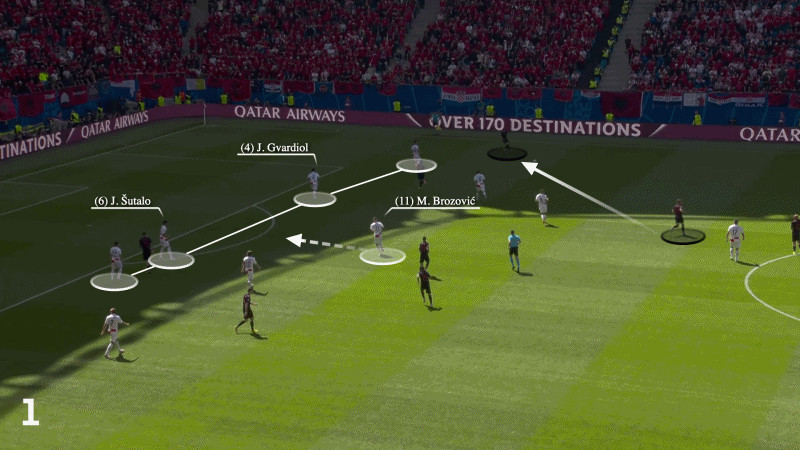 Croatia Albania goal conceded
Croatia Albania goal conceded
These gaps between Croatia’s center-backs were a recurring theme, often linked to their ball-dominant midfield’s positioning. Against Spain, Kovacic and Brozovic dropped deep to build from the back, widening the space between the central defenders. When possession was lost, this structural vulnerability was exposed.
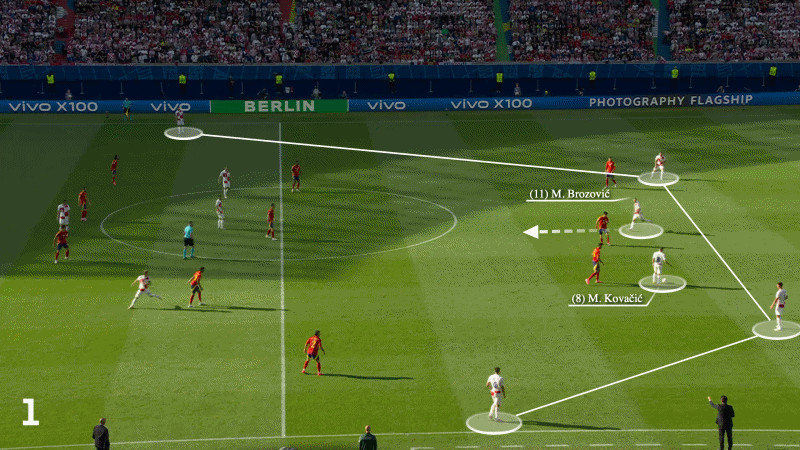 Croatia Spain goal conceded 2
Croatia Spain goal conceded 2
Earlier in the Spain match, a similar scenario highlighted Croatia’s vulnerability in transition, with Spain exploiting the central defensive space.
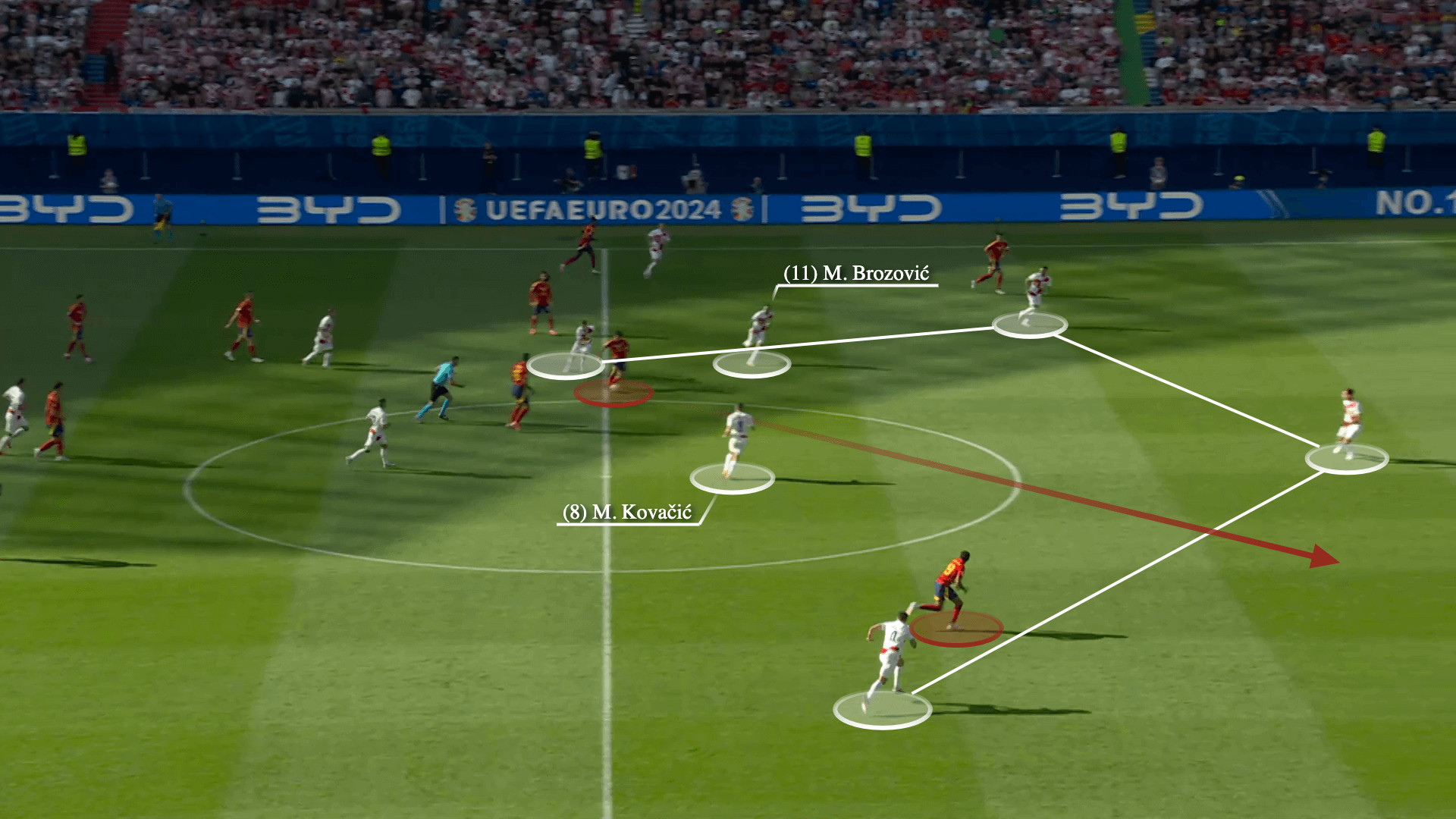 Croatia Spain chance
Croatia Spain chance
Dalic initially reacted defiantly after the Spain defeat, contrasting Croatia’s consistent success with England’s historical record. However, the reality of the Albania draw seemed to shift his perspective. “We couldn’t do anything right” in the first half against Albania, he admitted. “We were too slow, losing possession easily in midfield.”
He also noted Croatia’s lack of aggression, reflected in their zero yellow cards in the first two games. Dalic even pointed out Perisic’s age, a stark observation. After the Albania match, players were given a day off, perhaps to regroup and refocus. Dalic’s solution to midfield turnovers against Italy was to field even more midfielders.
Their formation against Italy resembled a 4-6-0, with Kramaric as a central attacker.
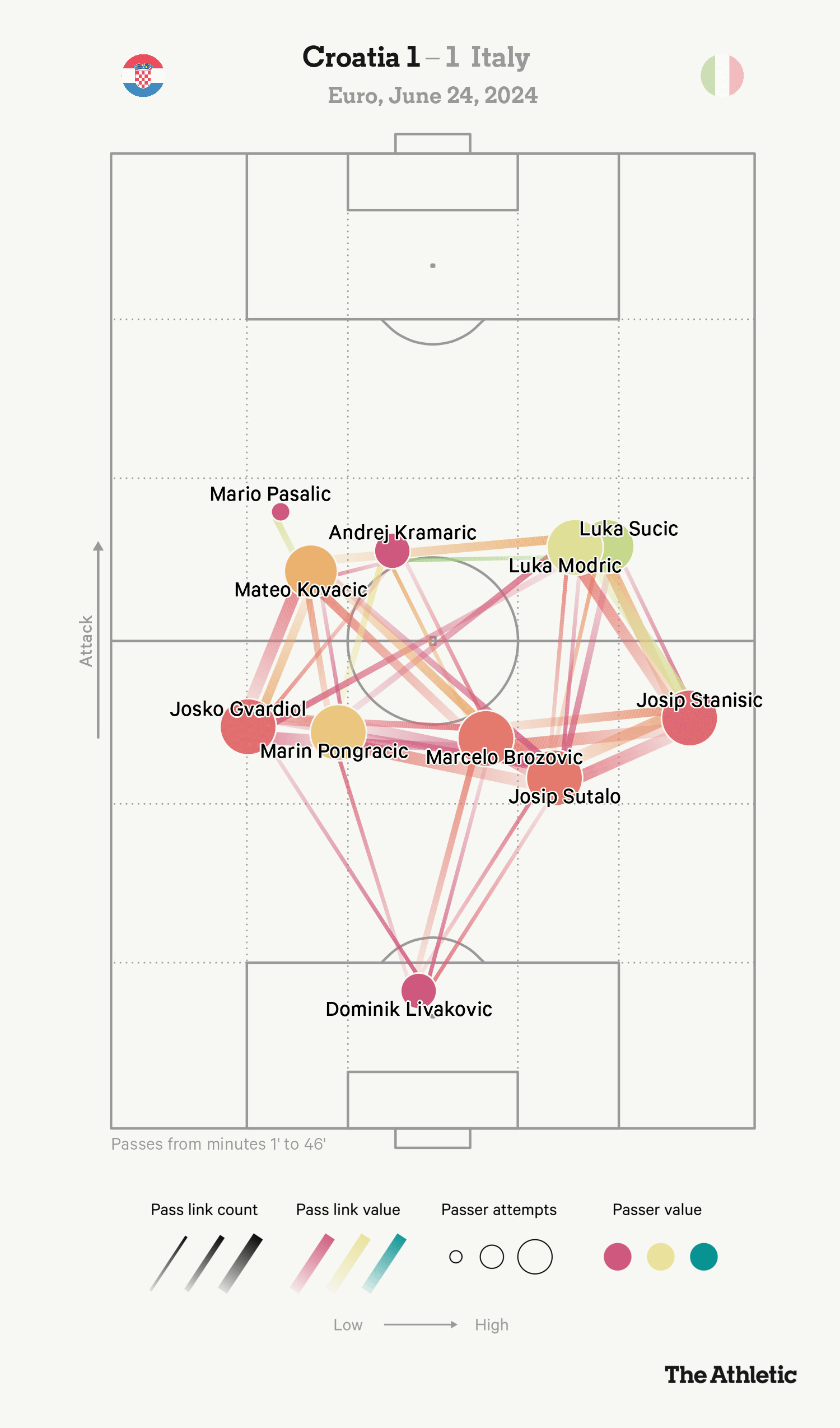 Croatia Italy network
Croatia Italy network
This approach yielded more control against Italy, but sacrificed attacking dynamism. They secured a lead but couldn’t extend it, and late defensive desperation led to Italy’s heartbreaking equalizer.
Zaccagni’s composure and finish in the final minute… 🥶#EUROGOTT | @AlipayPlus pic.twitter.com/pHyMHLzfot
— UEFA EURO 2024 (@EURO2024) June 24, 2024
The lasting image of Croatia’s Euro 2024 campaign may be a somber Modric accepting his man-of-the-match award, a bittersweet individual accolade in the context of team elimination.
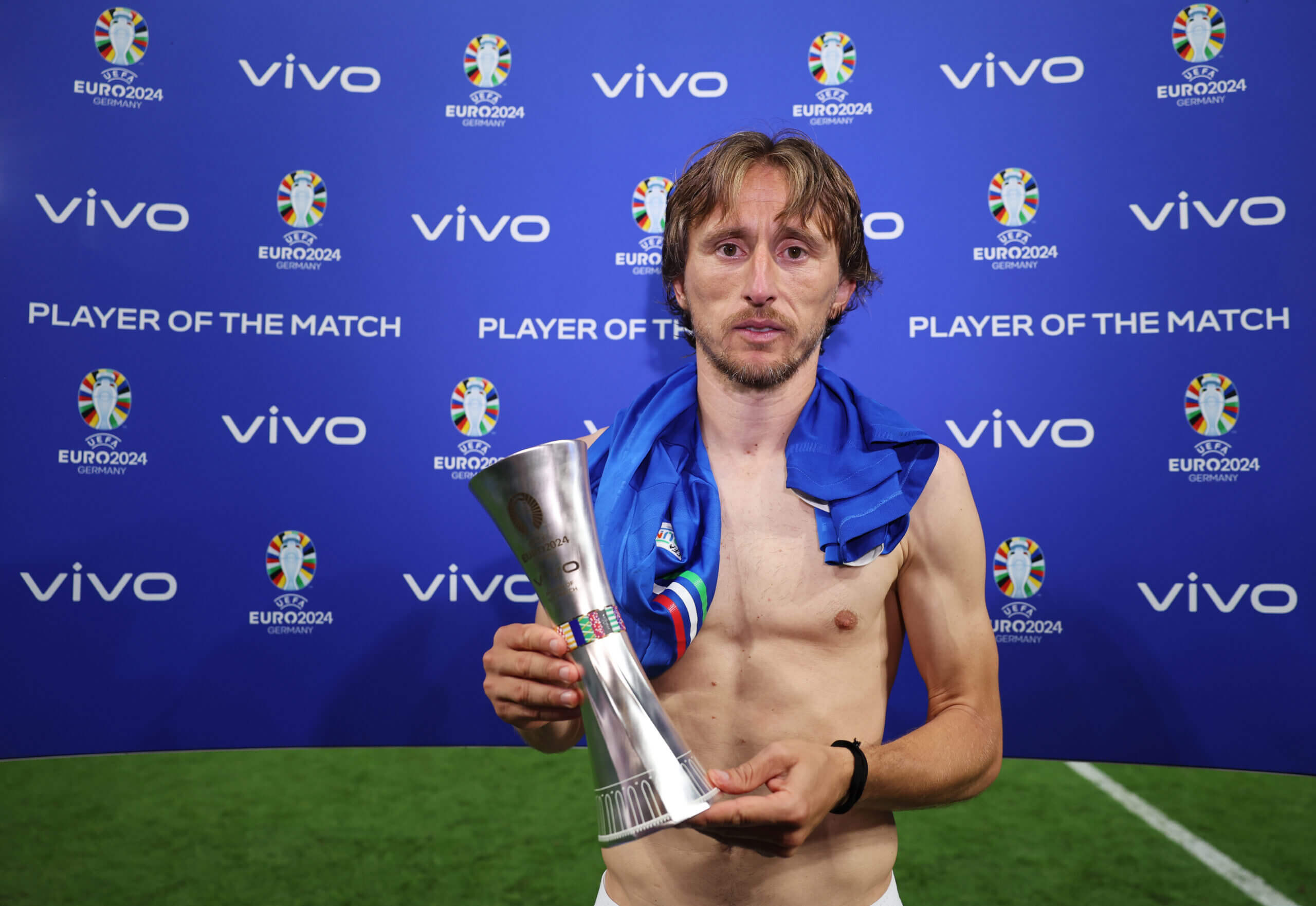 Luka Modric man of the match award
Luka Modric man of the match award
A golden generation, which emerged around 2008 and flourished from 2016 to 2023, appears to be concluding. Croatia has faced similar transitions before. The 2002 World Cup marked the end for a generation that reached the 1998 World Cup semi-finals and Euro 96 quarter-finals. Just as Davor Suker and Robert Prosinecki departed then, legends like Modric and Perisic are likely stepping aside now, their places in Croatian football history firmly cemented. Croatia’s Euro 2024 journey, their “last dance,” concludes not with a trophy, but a lap of honor recognizing a remarkable era.
(Top photo: Maja Hitij – UEFA/UEFA via Getty Images)

